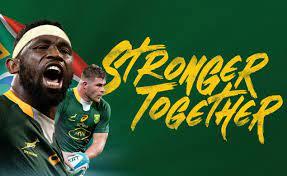When he was part of the Springbok coaching staff in 2007, Eddie Jones famously referred to the Boks’ style of play as “culturally appropriate rugby”.
Jones didn’t want to be seen as biting the hand that feeds, so couldn’t actually say “the Boks’ power-driven pattern can be boring” but, reading between the lines, you sensed this is what he meant.
Under coach Jacques Nienaber and director of rugby Rassie Erasmus the Springboks are no longer boring. They haven’t sacrificed the cornerstones of the local game, the scrum and the line-out, but they’ve built on traditional strengths to conjure up a side who offer substantially more than the team once did.
They’re creative, adapting their tactics to take advantage of the opposition’s weaknesses.
And they’re fun.
They’ve jettisoned the conservatism of 20 years ago when smaller, gifted players — I’m thinking of Brent Russell — were never given the chance to shine because coaches were in thrall to the cult of size.
No one exemplifies the “New Boks” more than fly-half Manie Libbok, he of the slick hands and ability to kick off either foot. Libbok weighs 76kg in those green-stockinged feet.
He was born in Humansdorp and went to Daniel Pienaar High in Uitenhage, outside Gqeberha, until Grade 10, when he was sponsored by Humansdorp businessman Christie Meyer and became a boarder at Hoërskool Outeniqua in George.
The experience changed him profoundly for the better.
“His teachers joked they wished he paid as much attention to his schoolwork as he paid to his rugby,” Outeniqua’s head of sport Piet Cloete told me a couple of months ago. “Now we understand why.”
Libbok is a brave heart but there can be no more fearsome a competitor (bar, perhaps, Eben Etzebeth) on a rugby field than Cheslin Kolbe.
A meme doing the rounds after South Africa’s nerve-shredding 29-28 victory over France on Sunday in the Rugby World Cup described him as “quicker than a debit order on payday” but he’s so much else besides. He’s courageous, creative. And cheeky.
After charging down former team-mate Thomas Ramos’s conversion on Sunday night when the score was 12-12, Kolbe explained the two had spent six years playing together at Toulouse and he knew Ramos took his time place-kicking.
In a one-point ballgame, Kolbe’s audacity might have won South Africa the harrowing quarter-final.
On the other wing, Kurt-Lee Arendse was also full value. With Libbok (and Damian Willemse) peppering the French wingers with diagonal up-and-unders, Arendse was the beneficiary of some sloppy defending after a Cobus Reinach kick to score the Boks’ first try.
The strategy worked again for the Boks’ second. Cameron Woki, the French lock, was helping his defenders out this time, but he could only juggle the kick before inadvertently knocking it into Damian de Allende’s waiting hands.
De Allende zoomed downfield on busy caterpillar-like legs before being scragged; Pieter-Steph du Toit was on hand to pick and drive and who should be up there to receive scrum-half Reinach’s pop ball? De Allende, who dived over like a man who couldn’t wait to plunge into cold water after an hour in the sauna.
Scored by Kolbe, South Africa’s third try was affected by Duane Vermeulen’s midfield turn-over, a great time to commit a burglary because no French defenders were at home. Jesse Kriel summed up the situation perfectly and his dinky grubber popped up to Kolbe as he scorched the turf like a fabled cartoon roadrunner to dot down.
All three Springbok tries came, to a lesser or greater extent, from what the rugby intelligentsia call “broken field”. The idea here is that broken field provides the perfect opportunity for a counter-attack because defensive systems are at their most vulnerable when the play breaks down in ways it’s not meant to.
The Boks will be keeping an eye on broken-field opportunities come their Saturday night semifinal against England but the coaching staff are too canny to leave it at that.
England are an immensely powerful side but they’re not a quick one, unlike, say, the All Blacks (or even France). This means the Boks will up the tempo. And try to move the ball away from England’s obdurate midfield of fly-half Owen Farrell and centres Manu Tuilagi and Joe Marchant. Expect Kolbe and Arendse to have busy evenings.
While the Springboks no longer possess the dire predictability they had under Allister Coetzee five years ago, a word or two of warning.
There were times in the second half against France in which the Boks became so slapstick that you almost expected the introduction of a cream cake or a levitating bowler hat.
Faf de Klerk, on as a second-half substitute, passed the ball to Du Toit when he wasn’t looking; Du Toit and RG Snyman got in each other’s way; De Klerk tried to milk a penalty from referee Ben O’Keefe by intentionally passing the ball at a French forward lying on the wrong side of a ruck. Willie le Roux, another second-half substitute, knocked on. The match itself was pure theatre but this was pure vaudeville.
The high jinks weren’t confined to one side. In the second half, Matthieu Jalibert, the French fly-half, succeeded in kicking the ball backwards.
It was that type of evening — full of dramatic second-half mistakes, strange happenings and beguiling misadventure; it was difficult to tell who was twitchier, the referee, the players or the fans.
The low comedy of the Boks’ second-half antics has been conveniently forgotten in the countrywide afterglow of success. If it happens again, the consequences could be dire.
There is little poetry with England, and, yes, they are Roundheads rather than Cavaliers, but they do have a kind of throttling power. And they are — few have deemed this worthy of comment — the only side in the semis not to have lost, the All Blacks having lost to France, the Boks to Ireland and Argentina to George Ford’s boot.
Importantly, in players like Farrell, they also have the requisite ruthlessness. At one stage in England’s quarterfinal against Fiji the score was locked at 24-all. England weren’t deterred. They simply rolled downfield and got close enough to the Fiji posts for a Farrell drop-goal. A penalty followed.
England won the game 30-24. From afar you could almost hear them dusting off their hands and asking, “What’s next?”
While the Boks’ performance against France went from the sublime to the ridiculous, the All Blacks put on a command performance against Ireland. They were 13-0 up, 18-10 up, and, while the Irish wrestled things back, it was a bravura display from the team many wrote off after their opening defeat by France.
Their opponents in Friday’s first semifinal are Argentina, who beat them 25-18 in The Rugby Championship in Christchurch last year. This misalignment of the rugby universe was quickly rectified.
Later in the competition, the All Blacks reminded Argentina via a 53-3, seven-try drubbing that they weren’t ready to sit at the top table just yet.
Might this have changed? Unlikely.
It should be a New Zealand vs South Africa final but because that’s all South Africans have been talking about this week doesn’t make it true.
England have been smarting for four years after their defeat in the final in Yokohama. They will be men possessed on Saturday night.





